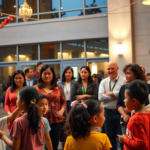JMIR Medical Education Calls for Papers on Bias, Diversity, and Cultural Competence
In an era when health disparities and systemic inequities occupy central positions in public discourse, JMIR Medical Education has issued an open call for submissions on bias, diversity, inclusion, and cultural competence in medical education. This initiative seeks to explore and address the pervasive implicit and explicit biases—such as gender and racial biases—embedded within healthcare education and practice. With this themed issue, JMIR Medical Education aims to significantly impact the way future medical professionals are trained to deliver equitable and culturally competent care.
A Premiere Venue for Medical Educators and Researchers
Indexed in some of the most prestigious databases, including MEDLINE and PubMed, JMIR Medical Education is widely recognized as a leader in digital health research. With an impressive Journal Impact Factor of 12.5, the journal wields considerable influence in the field, underscoring its role in shaping contemporary medical education. As an open access platform, it reaches educators, researchers, and policymakers globally, promising a wide dissemination of the ideas and innovations fostered by this call for papers.
Exploring Deep-Rooted Issues
For decades, biases in healthcare have significantly impacted patient outcomes and health policy. Conscious and unconscious biases—whether manifested as gender blindness, racial essentialism, or diagnostic overshadowing—pose obstacles to fair and efficient healthcare delivery. “Addressing bias in medical education is vital for achieving health equity,” states Dr. Rachel Munson, a local specialist in public health. “It’s not just about acknowledging these biases but actively working to dismantle them at their deepest roots.”
The publication invites submissions that critically examine how biases can corrupt clinical practices and educational structures and how these factors impact broader healthcare policies and access. These papers may investigate or suggest strategies such as creating equitable education environments, developing digital education tools, and establishing effective communication strategies to nurture more inclusive healthcare experiences—particularly for marginalized groups.
Local Impact: Opportunities for the Community
For communities across the United States, including those served by Woke News, the implications of this call for papers are profoundly significant. Communities strive to fortify policy efforts that aim to eradicate healthcare disparities—initiatives that might be buoyed through insights gathered from the research encouraged by this themed issue. Local medical institutions and schools can benefit significantly by adopting highlighted strategies that show success in other regions, contributing to their own ongoing efforts to foster a more inclusive and diversity-conscious environment.
“The potential local impact cannot be understated,” notes Jessica Liu, a healthcare activist based in Chicago. “Institutions here in the community that embrace these research findings can better address the unique needs of their diverse patient populations and help mitigate some of the longstanding inequities we observe in care and outcomes.”
In Line with Ongoing Efforts
This initiative by JMIR builds upon existing momentum in various local and national programs aimed at increasing diversity and reducing bias within the healthcare landscape. Online workshops, academic symposiums, and policy advocacy efforts are increasingly focused on the themes that JMIR Medical Education seeks to explore. This alignment enhances the potential for real-world application of research, rendering it more than just an academic exercise.
However, challenges remain in ensuring that theoretical research translates into practice. Past initiatives have shown that key obstacles include securing funding, gaining institutional buy-in, and overcoming entrenched cultural norms.
Looking Ahead: Forging Inclusive Health Systems
While the immediate aim of the themed issue is to generate valuable academic research, the long-term vision is one of transformational change in medical education and healthcare delivery systems. By encouraging methodologies that integrate bias awareness and cultural competence into digital learning and classroom settings, JMIR Medical Education positions itself at the forefront of efforts to engender meaningful systemic change.
The call is especially timely when considering advancements in technology within the healthcare field. Research on using AI, VR, and AR to teach intersectionality and develop competencies in understanding and combating bias is especially welcome. Local medical schools and training programs that adopt these innovative strategies are likely to see improvements not only in educational outcomes but also in patient satisfaction and success rates.
Get Involved
For those interested in contributing and engaging with this critical conversation, submissions to the themed issue are currently being accepted. This opportunity provides a platform for educators, researchers, and industry professionals to propose theoretical frameworks, offer case studies, and suggest actionable initiatives aimed at understanding and addressing bias in medical education.
The content is licensed under the Creative Commons Attribution License, emphasizing the journal’s commitment to openness and accessibility. For further information or to discuss potential topics for submission, interested parties are encouraged to contact the publication’s media liaison, Jane Kelly, directly at jane.kelly@jmir.org.
In the quest for a more inclusive and equitable healthcare system, the call from JMIR Medical Education stands as a pivotal moment. For communities nationwide and around the globe, it is a call to action—demanding that all stakeholders work collaboratively to address the inequities that compromise the health and well-being of millions.







